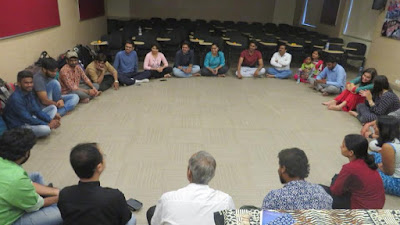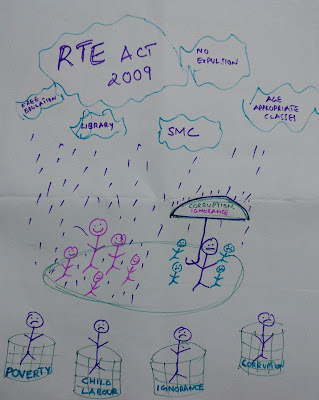Vimukt Shiksha Yatra: Episode 1
Vimukt Shiksha Yatra
was an initiative by the 'Indian Multiversities Alliance', a first of its kind;
"envisioned with an intention to inspire ideas, learnings and
collaborations towards re-imagining higher education". As an individual
who have been studying upon various alternate models of education, I was keenly
interested in the Yatra. The 6 day long Yatra started from Mumbai on 25th
February and concluded in Nashik on 02nd March.
Our first session in
Mumbai was hosted by 'Blue Ribbon Movement' (BRM), an organisation operating in
Mumbai to empower youth to become leaders of change by challenging gender
inequality, connecting communities, building peace and sharing knowledge. The twelve
Yatris assembled themselves at Don Bosco High School, Matunga and shared with
each other, our objectives behind attending the six day learning journey. We
interacted with fellows of 'People's unVersity', an alternate learning
programme forwarded by BRM. At the People's unVersity, the fellows co-create
and co-curate their teaching-learning modules, independent of an external.
Kejal Salva shared with us that the Blue Ribbon Movement was founded on the
idea "together we are stronger".
The other excerpts
from interaction with People's unVersity fellows were: "We believe
individuals can create their own learning journeys, not necessarily having to
rely on existing institutions to gain knowledge. We come together to re-think
learning for a better world. We decide where, when, how and what we wish to
learn for ourselves, rather than being pressured by a degree or a job. We
created a continuous informal, spontaneous and leisurely learning environment
free from the constraints of time and syllabi. Here we don't hold on to time
frames as subjects are considered boundless and learning a lifelong process'.
Later in the day we
met Mandakini Trivedi, a practitioner of Mohiniyattam, who runs Shakti
Yogashrama Gurukulam in Lonavla. We met her at her residence in Vile Parle,
Mumbai and engaged in conversations regarding the Gurukul system and the
traditional methods of learning.
Here are a few
snippets from the interaction:
On the art of
memorising -
Memory is important
for an individual for their intellectual growth and the art of memorizing has
been affected with changing times and emergence of technology. We emphasise on
learning from eyes, ears and experience. Mohiniyattam is a performing art and
it should be taught and learned through performance alone. My knowledge of art
should live in an other body and not in a book.
On the art of dance
-
There are plenty of
ways by which humans can interact with each other and also with the nature and
environment. Dance is one of the methods. Dance is for self expression and
communication. Dance is for peace and happiness. I establish connection with
God, one another and nature through my art. Dance is not just an art form, but
works wonders in a child's development as well.
On teaching -
learning practices -
In the Gurukal
system, the primary motive of the student is to receive. One doesn't always
question (the Guru). Whom are you questioning? There are times when you just
receive. And you can't receive without love and trust. If you reach puberty,
your body is ready to have a child. In a similar way, the student is to achieve
a level of maturity to have their own questions and own creation. Until then,
the teacher has to guide (the student). Scepticism is a loss to humanity. A
guru's role is to fill the vessel (which is the student's mind and
imagination), but to expand the vessel.
On Education -
The notion that
education is for bread and butter is faulty. Skill building is important. But
again, skills can be learned from anyone. That is where importance of Gurukula
comes into picture. It is all about character building and value based living.
These are what makes one a human being. Now there is a lot of stress on
alternate education. It was already there decades back. Generations back. The
natural methods of education have now become alternatives. Degrees and
certificates are the result of British education. The student oneself is
supposed to be the certificate for their knowledge, skills and learning. In ancient models, the system cooperates with
you. Now you obey a system that actually stays away from you.
tbc.






Comments
Post a Comment